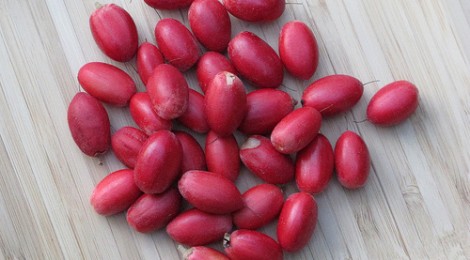
My Miraculin Immunity
Imagine ingesting something with the ability to confuse your taste buds so radically that they can’t distinguish the flavor of a tart lemon from sweetened lemonade. You’d think a substance with such far-fetched qualities could only be conjured by the mind of Willy Wonka. Contrary to popular belief, inducing this hallucination of the taste receptors is possible.
Synsepalum dulcificum, otherwise known as the miracle fruit, has become a popular novelty among curious “flavor-trippers,” earning its namesake from its high miraculin content.
Found in the tiny red berries of this indigenous West African plant, miraculin is a glycoprotein notorious for amplifying sweet sensations on the palate.
Miracle berries have been used to spruce up the taste of meals since before being first noted by explorers in the early 1700s. However, new trends have evolved incorporating miraculin in party atmospheres. This FDA classified “food additive” exploded in popularity in the twenty-first century due to its glorified social appeal.
Flavor tripping parties are a growing phenomenon among all age groups. Guests at these events typically pitch collectively to purchase the taste bud twisting berries, while out of the ordinary snacks are usually provided by the host.
Taste receptors under the influence of miraculin have been known to fool some into mistaking goat cheese for cake icing and passing Guinness beer as a chocolate shake. According to miracleberry.wordpress.com, drinking straight Tabasco sauce is “delicious” but the website also advises, “don’t drink too much.”
Naturally after being reassured I wouldn’t be harming my body or breaking the law by consuming these things, I was curious to try the experiment myself. So I chose to join the flavor-tripping revolution and purchased some berries of my own online.
Twenty dollars less in my wallet and a week of anticipation later, I placed one miracle fruit tablet on my tongue –meanwhile my sense of taste was preparing for its first psychedelic experience. Expecting a flurry of foreign, delicious flavors to invade my mouth, I was surprised to notice everything tasting so overwhelmingly . . . normal.
I could be a freak of nature, but nothing tasted unusual despite conducting three taste-tripping trials.
My dreams of sipping hot sauce from the bottle, with the aid of a little performance-enhancing berry, were in vain. Tabasco still had its fiery sting even with a dissolved miracle berry tablet coating each of my taste receptors.
I have heard enough testimonials to buy in to the validity of the miracle fruit, but as I reflect on my experience I’m disappointed and confused about why I’m apparently immune to miraculin.
Flavor-tripping might have failed for me, but this glycoprotein is scientifically proven to influence people varyingly. If you’re feeling too lazy to take the lemons you’re given and make lemonade, allow me to introduce synsepalum dulcificum as a more convenient alternative.
It’s actually a cool and useful piece of information about Miracle fruit. I’m satisfied that you shared this useful
info with us.
Please stay us up to date like this.
Thank you for sharing.